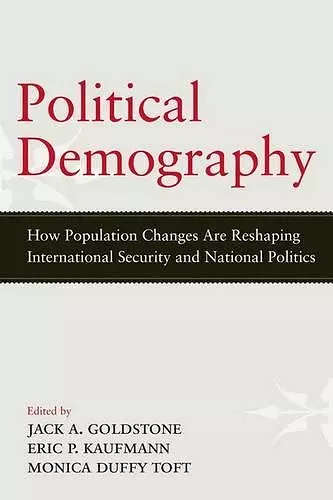Political Demography
How Population Changes Are Reshaping International Security and National Politics
Jack A Goldstone editor Eric P Kaufmann editor Monica Duffy Toft editor
Format:Hardback
Publisher:Oxford University Press Inc
Published:5th Jan '12
Currently unavailable, currently targeted to be due back around 1st February 2025, but could change
This hardback is available in another edition too:
- Paperback£33.99(9780199945962)

The field of political demography - the politics of population change - is dramatically underrepresented in political science. At a time when demographic changes - aging in the rich world, youth bulges in the developing world, ethnic and religious shifts, migration, and urbanization - are waxing as never before, this neglect is especially glaring and starkly contrasts with the enormous interest coming from policymakers and the media. "Ten years ago, [demography] was hardly on the radar screen," remarks Richard Jackson and Neil Howe of the Center for Strategic and International Studies, two contributors to this volume. "Today," they continue, "it dominates almost any discussion of America's long-term fiscal, economic, or foreign-policy direction." Demography is the most predictable of the social sciences: children born in the last five years will be the new workers, voters, soldiers, and potential insurgents of 2025 and the political elites of the 2050s. Whether in the West or the developing world, political scientists urgently need to understand the tectonics of demography in order to grasp the full context of today's political developments. This book begins to fill the gap from a global and historical perspective and with the hope that scholars and policymakers will take its insights on board to develop enlightened policies for our collective future.
Political Demography" is a collection of essays that shows some of the results of the new research in more detail. A chapter by Mark Haas of Duquesne University in Pittsburgh argues that demographic change will consolidate America's strategic position because all other leading nations have such dire demographic trends. China's one-child policy means there is a shortage of women of child-bearing age. As a result, between now and 2050 the number of men in China aged 20 to 25 (ie, of prime military recruiting age) will halve. Similarly, points out Eric Kaufmann, in many countries, fundamentalist religious groups have fertility rates two or three times higher than the societies in which they live. Israel is a good example. Over time, this will alter the balance of power in those countries. * The Economist *
ISBN: 9780199949229
Dimensions: 152mm x 229mm x 21mm
Weight: 626g
344 pages